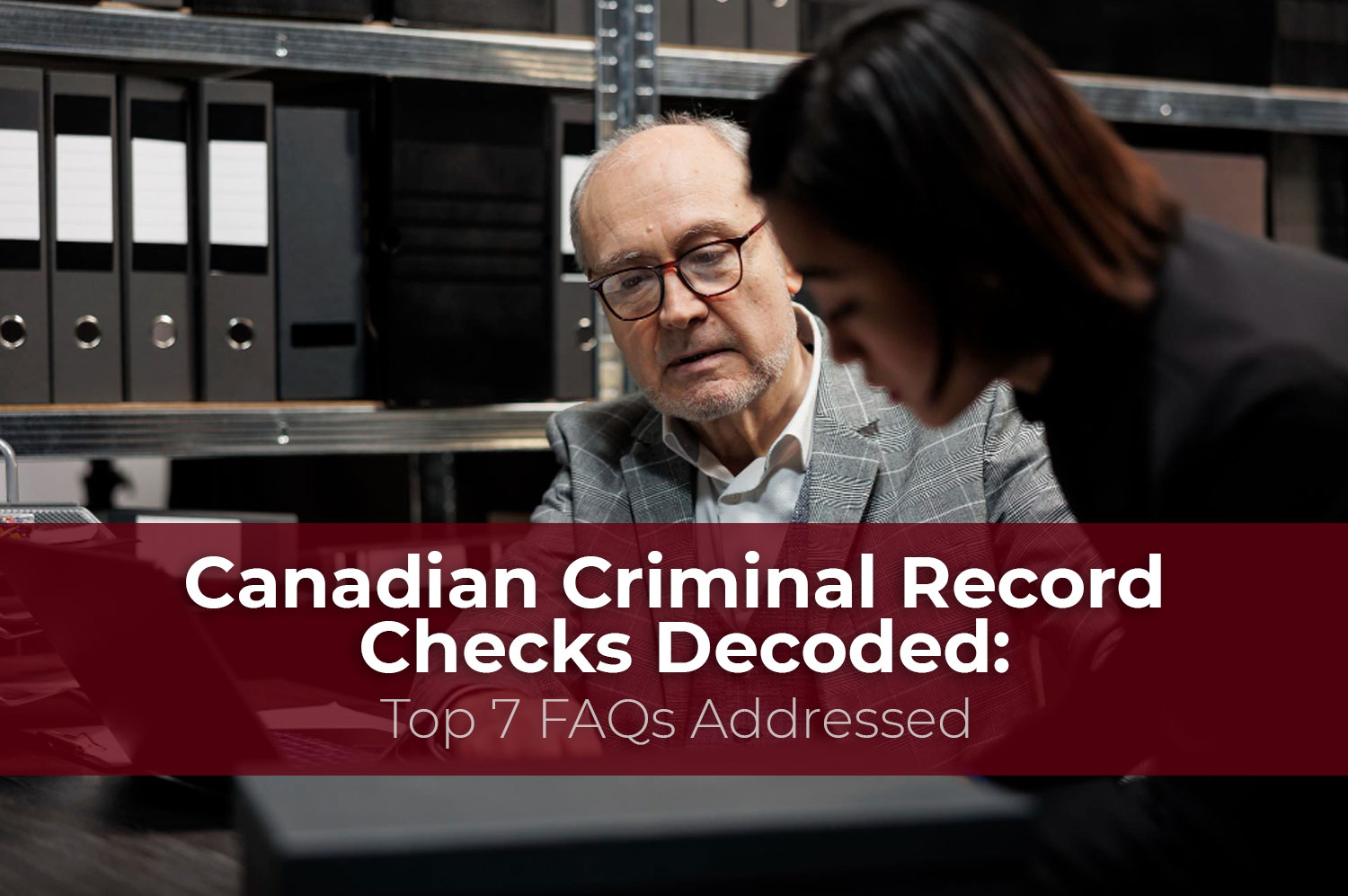
This guide aims to demystify the process, answering the ten most frequently asked questions surrounding criminal record checks in Canada, providing you with the knowledge needed to make informed decisions.
As we delve into each query, we’ll explore the legal frameworks governing criminal record checks, the types of checks available, and how these checks impact various aspects of Canadian life. Whether you’re concerned about the implications for employment, immigration, or personal background assessments, this guide is designed to be your go-to resource for accurate and up-to-date information. Join us on this journey as we unravel the complexities and empower you with the knowledge to navigate the realm of Canadian criminal record checks with confidence.
Table of Contents
ToggleDefinition of Criminal Record Checks - What is Criminal Record Check?
Criminal Record Check (CRC) is a process through which law enforcement agencies and authorized service providers assess an individual’s criminal history. The check is conducted to determine if a person has a criminal record or if they have been involved in any criminal activities.
Individuals may be required to undergo a Criminal Record Check for various purposes, including employment, volunteer work, adoption, immigration, or obtaining a record suspension (formerly known as a pardon). The request for a Criminal Record Check is typically made by the individual, and they may need to provide fingerprints for verification.
It’s important to note that the process and requirements for Criminal Record Checks can vary by province or territory in Canada, and there may be specific regulations depending on the purpose of the check. Additionally, certain convictions may become spent or pardoned over time, affecting their inclusion in the check results.
Before using any software or service for criminal record checks, it's crucial to ensure that the chosen method complies with Canadian laws and regulations, especially concerning privacy and the use of sensitive personal information.

Top 3 Services for Criminal Record Check in Canada
Key features of CPIC include:
- Criminal Record Information: CPIC contains information related to criminal records, including convictions, charges, and warrants. This information is used by law enforcement agencies to assess the criminal history of individuals.
- Stolen Property Information: CPIC includes data about stolen property, such as vehicles and valuable items. This information helps law enforcement agencies identify and recover stolen goods.
- Missing Persons Information: CPIC is utilized to store information about missing persons. This aids in locating and reuniting missing individuals with their families.
- Firearms Information: CPIC contains details about registered firearms and individuals with firearms licenses. This information is crucial for monitoring and regulating firearms ownership in Canada.
Third-Party Background Check Services:
Police Information Check (PIC) Software:
Before using any software or service for criminal record checks, it’s crucial to ensure that the chosen method complies with Canadian laws and regulations, especially concerning privacy and the use of sensitive personal information.
Different Types of Criminal Record Checks in canada
The purpose of a Police Information Check (PIC) is to provide individuals, employers, or organizations with information about an individual’s criminal history. It is a background check conducted by police services in Canada and is often requested for various purposes. The key purposes of a PIC include:
- Employment Screening
- Volunteer Positions
- Licensing and Certification
- Adoption Process
- Security Clearance
- Immigration and Citizenship
- Public Safety
- Confidentiality and Trust
- Preventing Fraud and Misrepresentation
- Legal Compliance
A Royal Canadian Mounted Police (RCMP)
The RCMP Criminal Record Check may be required for various purposes, such as employment in sensitive positions, security clearances, immigration, and other situations where a comprehensive background check is necessary.The RCMP has access to national databases, allowing for the retrieval of criminal records from across Canada.This includes information on convictions, charges, and other relevant details.
Vulnerable Sector Check (VSC)
It is a type of background check conducted by law enforcement agencies in certain jurisdictions. It is designed to assess individuals who may be in positions of trust or authority over vulnerable populations, such as children, the elderly, or people with disabilities. The purpose of a VSC is to identify individuals who may pose a risk to these vulnerable groups.
The VSC typically involves a thorough examination of an individual’s criminal record, including convictions and outstanding charges. In addition to the standard criminal record check, the VSC may also include a check for findings of guilt in cases of certain offenses, even if they did not result in a conviction.
These offenses often relate to sexual misconduct, violence, or other behaviors that could potentially harm vulnerable individuals.Individuals who are required to undergo a VSC are often those applying for positions that involve a high degree of trust and responsibility, such as jobs in education, healthcare, social services, or positions that involve working closely with vulnerable populations.
If you have more specific questions about the Vulnerable Sector Check in a particular jurisdiction, it’s advisable to consult the relevant law enforcement agency or government office responsible for conducting these checks in that area.
Employment screening checks
It is a common practice for employers to ensure they are making informed hiring decisions. These checks may include various components, and the extent to which they are conducted can vary depending on the nature of the job and industry. Here are some common elements of employment screening checks in Canada:
- Criminal Background Check
- Reference Checks
- Education Verification
- Credit Check
- Driver’s Abstract
- Drug and Alcohol Testing
It’s important to note that employment screening practices are subject to privacy laws and regulations, such as the Personal Information Protection and Electronic Documents Act (PIPEDA) in Canada. Employers are generally required to obtain consent from candidates before conducting certain types of checks, and they must handle personal information with care to ensure compliance with privacy laws.
Who Needs a Criminal Record Check
- A criminal record check, also known as a background check or police check, is often required in various situations to assess an individual’s criminal history. Different organizations and situations may necessitate such checks for various purposes.
- Here are some common scenarios where a criminal record check might be needed
- Some educational institutions, especially those at the K-12 level, may require criminal record checks for teachers and staff to ensure the safety of students. This is particularly important in institutions where employees have direct contact with children.
- Certain professions, such as doctors, nurses, lawyers, and financial advisors, may require individuals to undergo criminal record checks as part of the licensing process. This is to maintain the integrity and trustworthiness of those in these professions.
- Jobs in sensitive industries, such as healthcare, finance, and government, often require criminal record checks. Employers want to ensure the safety and trustworthiness of individuals working in positions that involve handling sensitive information, finances, or the well-being of others.
- Roles that involve working with vulnerable populations, such as children, the elderly, or individuals with disabilities, may require a criminal record check. This is crucial to create a safe environment and prevent individuals with a history of offenses against vulnerable populations from obtaining such positions.
- Organizations that rely on volunteers, especially those working with vulnerable populations or in community service, may request criminal record checks to ensure the safety of the community they serve.
- Individuals seeking to adopt a child often undergo thorough background checks, including criminal record checks, to assess their suitability as adoptive parents. This is done to ensure the well-being of the child being adopted.
- Individuals working in government or defense-related positions may need to obtain security clearance. This process typically involves an extensive background check, including a criminal record check, to ensure the individual can be trusted with classified information.
Process of Obtaining a Criminal Record Check in canada
Navigating the process of obtaining a criminal record check in Canada is a crucial journey, laden with implications for various aspects of life. Whether seeking employment, volunteering, adopting, or dealing with immigration requirements, individuals find themselves at the intersection of personal history and the expectations of organizations and authorities. This comprehensive guide aims to illuminate the intricate steps involved in obtaining a criminal record check in Canada, shedding light on the nuanced procedures, considerations, and regional variations that applicants must navigate.
- Determine the Type of Check Needed
- Identify the Jurisdiction
- Visit the Local Police or RCMP Detachment
- Provide Identification
- Complete the Application Form
- Pay the Fee
- Fingerprinting (if required)
- Wait for Processing
- Receive the Results
Turnaround Time and Validity
The turnaround time and validity for criminal record checks can vary depending on the jurisdiction, the type of check, and the specific policies of the agency conducting the check
Turnaround Time
- Instant Checks: Some criminal record checks can be done instantly or within a few hours using online databases. These are often preliminary checks and may not provide the most up-to-date information.
- Standard Checks: In many cases, a standard criminal record check may take a few days to a few weeks. This is because the process may involve contacting various agencies to obtain complete and accurate information.
- Fingerprint Checks: Fingerprint-based checks, which are considered more thorough, can take longer, often ranging from a few weeks to a couple of months.
Validity
The validity of a criminal record check refers to the period of time for which the results are considered current and acceptable. The validity period varies and is often determined by the organization or entity requesting the check.
- Employment Background Checks: Many employers require a recent criminal record check as part of the hiring process. The validity period for employment purposes is often limited (e.g., 30 to 90 days), and candidates may be required to undergo a new check if the hiring process extends beyond that timeframe.
- Volunteer Positions: For individuals volunteering with vulnerable populations or in sensitive roles, a criminal record check may be required. The validity period for volunteer checks is typically shorter than that for employment checks.
- Government Security Clearances: For individuals seeking government security clearances, the validity period may be longer, but periodic reinvestigations are often required.

The turnaround time and validity for criminal record checks can vary depending on the jurisdiction, the type of check, and the specific policies of the agency conducting the check
What Information is Included?
It’s important to note that privacy laws and regulations govern the release of certain information, and not all offenses may be disclosed. Additionally, individuals have the opportunity to apply for a record suspension (formerly known as a pardon) through the Parole Board of Canada, which, if granted, can remove the record from the Canadian Police Information Centre (CPIC) database for most purposes.
The specific details and requirements for criminal record checks can vary by province or territory, and certain industries or positions may have additional criteria. Always check with the relevant law enforcement agency or authorized screening agency for the most accurate and current information.
In Canada, criminal record checks typically include information about an individual’s criminal history. The specific details can depend on the type of criminal check conducted, but here are the main components:
Criminal Convictions:Information about convictions for criminal offenses is a primary component. This includes details about the nature of the offense, the date of conviction, and any associated penalties.
- Summary and Indictable Offenses:The check may provide information on both summary and indictable offenses. Summary offenses are less serious, while indictable offenses are more serious and typically involve a trial.
- Outstanding Charges: A criminal check may include information about any charges that are currently pending or outstanding.
- Absolute and Conditional Discharges: Details about any absolute or conditional discharges may be included. Discharges are outcomes where an individual is found guilty, but a conviction is not registered after a certain period, provided certain conditions are met.
- Vulnerable Sector Check (if applicable): For positions involving work with vulnerable populations, a more in-depth check, known as a Vulnerable Sector Check, may be conducted. This can include additional information about judicial orders, outstanding charges, and police contact, even if charges were not laid.





























